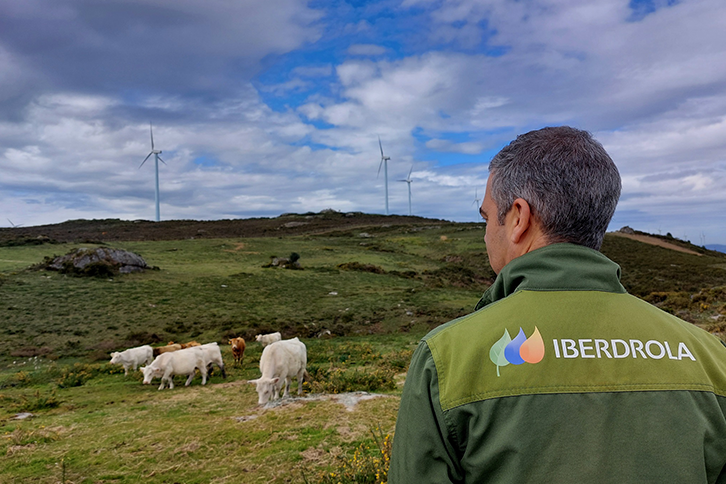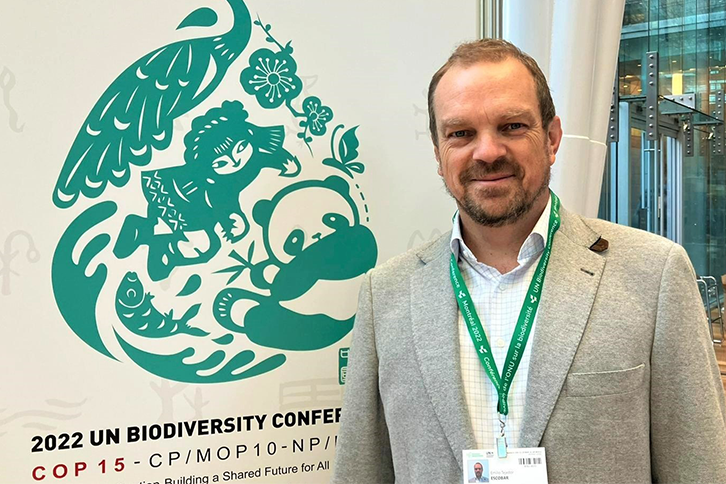News
2022-12-12 11:35:00.0We presented our plan to achieve positive impact by 2030 at the World Biodiversity Summit in Canada
- Emilio Tejedor, the company's environmental director, explained the commitment that will be applied to all activities and facilities around the world.
- The company establishes an innovative accounting framework for quantifying the impact of its actions on ecosystems.
Iberdrola has set itself the goal of achieving a net positive impact on the ecosystems and species where it operates by 2030. The new Biodiversity Plan was presented by Emilio Tejedor, the company's environmental director, at the World Biodiversity Summit (COP 15) currently being held in Canada. This new Biodiversity Plan establishes the necessary mechanisms to ensure that its activity contributes, by the end of this decade, to generating better environmental conditions than those that existed previously.
For Emilio Tejedor "Iberdrola's Biodiversity Plan is a continuation of the path set since 2007 with the approval of its first Biodiversity Policy. This plan complements the company's Climate Action and Circular Economy plans, which address decarbonisation and the sustainable use of resources for the comprehensive protection of the nature that surrounds us and on which we vitally depend".
The preservation of nature and the well-being of people are priority elements in the company's business model. In this sense, we are facing an unprecedented environmental crisis, in a scenario characterised by a strong growth in global energy demand, and we are therefore working to build an energy model in harmony with nature and human beings as a source of sustainable development.
The Biodiversity Plan - which is aligned with the 2050 Vision of the Convention on Biological Diversity - establishes three main lines of action. The first of these establishes a pioneering accounting framework for quantifying the positive and negative impacts on ecosystems and species arising from the construction, operation and decommissioning of facilities. In this way, the company will be able to monitor the degree of compliance with its objective and review its biodiversity action plans to ensure their achievement.
The second line of this plan establishes the need to intensify biodiversity conservation and regeneration actions in order to achieve this ambitious goal. To this end, Iberdrola has set a goal for 2025 to evaluate and review the action plans of the assets of all of its technologies considered to be a priority due to their degree of impact or strategic importance. The 2030 target contemplates the review and creation of plans for 100% of its facilities worldwide.
Finally, the Biodiversity Plan includes the need to drive systemic change through action for biodiversity, the promotion of research into conservation, restoration and regeneration solutions, as well as the transmission of knowledge to achieve the necessary cultural transformation. Iberdrola thus intends to be a driving force for this change, integrating biodiversity into all of the group's internal strategic planning and decision-making processes.
This roadmap reinforces the company's commitment to the conservation of ecosystems and its commitment to making the supply of competitive, clean and sustainable energy fully compatible with environmental balance.
Biodiversity protection actions
Iberdrola annually carries out more than 750 actions to protect biodiversity, combining the development of renewable and grid projects with the conservation of the diversity of flora and fauna and the care of natural heritage. These actions are integrated into programmes to promote the conservation and restoration of ecosystems and species, impact prevention and mitigation plans, and initiatives to improve knowledge through research and collaboration with stakeholders. All of these actions are detailed in the "Biodiversity Report", which Iberdrola periodically publishes.
These include the 'Tree Programme', focused on promoting biodiversity through the conservation and restoration of forest ecosystems, through which the company has already planted more than 2.3 million trees in seven countries in the last two years. This initiative, launched in 2020, aims to plant and conserve up to 20 million trees in the coming years around the world. It is also worth highlighting the conservation actions in more than 18,000 ha of different Brazilian biomes, mostly in the Amazon rainforest, and the restoration of more than 9,500 ha of degraded peatlands in management plans in the United Kingdom, favouring the populations of birds of prey and wading birds.
In the protection of species, an example to highlight is the conservation agreement that the company has created in the United States for the conservation of the Monarch Butterfly, whereby vegetation management strategies are carried out in an area of approximately 4,000 ha in its distribution networks, creating an ideal habitat for its conservation.
The company is also working on the implementation of innovative measures to improve our interaction with species, such as the installation of cameras in wind farms which, when they identify a protected bird, emit sounds so that it deviates or directly activate the wind turbine to stop, as well as the painting of one of the blades or the installation of vinyls in the shape of an eye as deterrent measures. Another measure that minimises the impact on the ornithological community is the effort made to improve the aerial network: in Spain alone, more than 80,000 pylons have been adapted and in the United States more than 24,000 have been replaced.
Iberdrola conducts numerous research projects that, in addition to being the basis for planning measures to prevent or reduce impacts, in many cases have helped to fill gaps in knowledge and enhance the value of certain ecologically important areas. This is the case of offshore wind projects in which, with respect to the ecology of birds and marine mammals, innovative studies have been conducted within the framework of innovative R&D projects.
Also noteworthy are the projects that Iberdrola carries out through its foundations with various stakeholders, such as the Coralizar Project in Brazil in collaboration with WWF, which works to restore corals in an area of 4,400 hectares of reefs, researching new methodologies and promoting knowledge, awareness, and benefits for the community. Other significant initiatives are the Migra project in Spain or the Flyways project in Brazil focused on bird conservation, and initiatives to support indigenous communities, among others.
The culture of biodiversity protection is also evident in the more than 12,000 Iberdrola volunteers who have participated in various actions related to biodiversity conservation over the past two years throughout the world.








